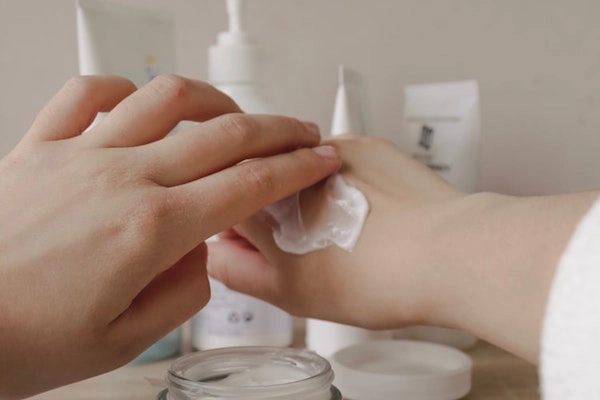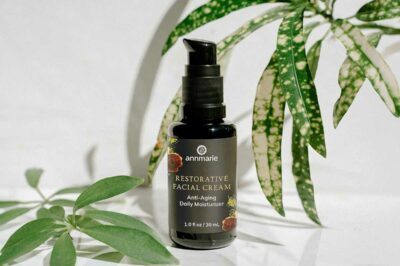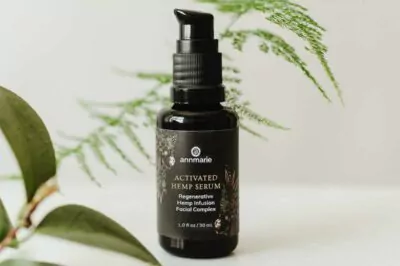Table of Contents[Hide][Show]
Look at some of your regular store-bought cosmetics, like your makeup, skin care, or hair-care products, and you may find listed there the ingredient “urea.” Doesn’t sound too appetizing, does it? Turns out that it’s not.
Used as a preservative and/or a moisturizer, urea can increase your risk for contact dermatitis, and has also been shown to release formaldehyde—a carcinogen.
It says it’s moisturizing, but what ingredient is it using to actually moisturize?
What is Urea?
You may have heard that urea comes from urine. In a way, that’s true. It is an organic, waste compound produced by the body after metabolizing protein. The liver breaks the proteins down in a process that produces urea. It is then excreted by the kidneys in the urine. It is also excreted through sweat, and regular healthy skin has a small amount of urea on the very outer layer.
Urea in cosmetics, however, is man-made in the laboratory. Same chemical formula, just synthetically made. The raw materials are ammonia and carbon dioxide. Not something you’d think you’d put on your skin, right?
Manufacturers like it, though, because it slows the loss of moisture from a product during use, helping to extend shelf-life. Urea also makes it easier to add certain ingredients to a formula, maintaining pH balance. It also slightly alters the skin’s structure, allowing other chemicals to penetrate deeper into the skin, which can increase the effectiveness of certain products. Finally, it increases the moisture content in the top layers of skin, so after you use a product with urea in it, you’re likely to feel like your skin is soft and supple.

What Products Contain Urea?
It can be found in a large number of products, including the following:
- Facial moisturizers
- Facial cleansers
- Anti-aging creams
- Body lotions
- Eye creams
- Foundations
- Shampoos & conditioners, styling mousses and foams
- Acne treatments
- After shave
- Lip balm/treatments
- Mascara
- Sunless tanning products
- Antiperspirants/deodorants
- Cuticle treatments
- Nail polishes
DIY How to Clean Your Makeup Brush
Why Are People Concerned About This Ingredient?
There are three main concerns with this ingredient. They include:
- Releases formaldehyde: According to a study published in 2010, ureas can release formaldehyde, which has been classified as a human carcinogen. In addition, the test found a clear relationship between patch test reactions to formaldehyde-releasers like urea and contact allergy to formaldehyde.
- Can be irritating: According to the Material Safety Data Sheet on this substance, it can cause skin and eye irritation, and prolonged exposure can cause reproductive effects.
- Tendency to cause allergic reactions: Whether related to its tendency to release formaldehyde or not, urea has a tendency to cause allergic reactions. Those with sensitive and infected skin are advised to steer clear of this ingredient. In fact, the American Academy of Dermatology has established diazolidinyl urea as a primary cause of contact dermatitis.
How to Avoid Ureas?
As I always say, why use ingredients on your skin that a) provide no benefit, and b) are potentially harmful? Though ureas may be slightly moisturizing, there are far better and healthier moisturizers, such as honey, shea butter, aloe, and more. Fortunately, you can easily find name on product labels. Avoid anything that lists the following:
-
- Diazolidinyl urea
- Imidazolidinyl urea
- DMDM hydantoin
- Sodium hyroxymethylglycinate
Source
De Groot A, “Formaldehyde-releasers in cosmetics: relationship to formaldehyde contact allergy,” Contact Dermatitis, January 2010, http://www.ncbi.nlm.nih.gov/pubmed/20136876.








Urea creams are the only thing that helps with my super dry skin which cracks to the flesh in winter. Nothing else helps. No oils, Shea butter etc. Cracked skin is super painful. My dermatologist recommended Urea creams & I’m so grateful. Have had no adverse reactions, only positive experiences. Please don’t say there’s not reason to put urea in creams, there definitely is for me.
This is very informative. Thank you so much. I’ve come across an eye cream with urea on their Eye cream. While my initial reaction was to avoid it, I wanted to research more on this and came across your article. Thanks a ton. I’ll steer clear from those products now.
is there anyone out there that has a complete list of say the top 500 health and beauty products that contain urea? thx. B
I use products exclusively from a local friend who has a soap/skin care products store where she hand-crafts every product. It is called Tashi Soaps and when you are local, she even delivers. I never use anything on my skin except her products after an anaphylactic reaction so a burn gel that had one of the above-noted products…it took 3 months of steroids for me to get a skin that didn’t break out at even touching someone who had recently applied a typical cosmetic lotion product!
I am thankful this woman started her business. She has even formulated a couple of hair and foot products for my diabetic skin so I am not so dry.
I would be interested in her products.
My colleagues were searching for FL CF-FSP Form 5211 yesterday and came across a company that has a searchable forms database . If people need FL CF-FSP Form 5211 too , here’s
https://goo.gl/eYNypTI just suffered through 3 months of constant hives only to find out this is what I’m allergic to. Well, this and 2 other chemicals. I only eat organic food…I don’t know why I skimped when it comes to these products. I learned my lesson!
I have just tested positive to the following
Quaternium-15 (dowicil 200)
Imidazolidinyl Urea
2.5 Diazolidinylurea
All three of these also go by other names. I have only just begun my research and I’m exhausted. I haven’t worn moisturizer, makeup, lotion, deodorant, or hairspray. Does anyone know if these are in foods as well? I am afraid of everything now. The blisters I get are aweful. Thanks Ruth
I came across this article in a search for urea. I see others have addressed the scientific inaccuracies it includes about urea “releasing formaldehyde”. As you hopefully know by now, urea is a natural hydrating agent, and does not on its own create formaldehyde.
For the sake of not spreading ignorance about perfectly safe cosmetic ingredients, please remove or revise this article. And seriously, spend a minute doing some research if you are going to present yourself as an expert on a topic.
u are right actually Urea reduces free formaldehyde
This blog is about synthetic urea not good natural urea. Perhaps you all who are bashing this information may be confused.
This article is misleading. You have to distinguish between moisturising urea which occurs naturally in the skin (!) and these preservatives. Not the same thing.
I took the “Skin Snapshot Quiz”, and was surprised when I got to the final question. “Do you eat only organic food?”
What does that have to do with skin health? it has no relation to health in any way. Organic food is not healthier than traditionally-grown food. Please stop spreading myths and fear mongering. You are misinforming people and doing harm to the world.
I ordered 100% aloe vera gel online and turns out even that contains urea. I am so disappointed. I think I will stick to my sweet almond oil and lavender oil mixture for now.
Thanks to share this informative information about cosmetic products
Hi Berverly, a few years back I tested positive for diazolidinil urea. I cant fold my clothes without gloves on. Its a very horrible thing to live with. I’m with you in the frustration. I have used Ava Anderson products on my face to clean and used alot of her other products. They are all natural and very good. Please look up her sight and hopefully that will help you out.
Just a few weeks ago my 7 year old daughter tested positive to another formaldehyde, MCI/MI. Which is in everything else that diazolidinil urea isnt in. Its a very real and horrible thing to always be on guard with. I hate it. But on the other hand it is making us be healthier in the long run, right? Lol.
I worked in a day spa in New York and had to test different products for the business. I learned to stay away from products containing Urea back in 2000. Everyone said It was my imagination and that your body tends to change as you get older, but I knew that the ichy hives I would get were not from the sun or something I ate. I learned to take a magnifying glass with me, however when shopping for cosmetics, shampoo/conditioners, sun tanners/blockers, lotions…. The ingredient list is soooooo small Haha
I am extremely allergic to formaldehyde and formaldehyde releasing agents. For the people commenting on here that over the counter products are not sold with these ingredients is a terrible lie! I’m thankful I happened upon this website because you listed some formaldehyde releasing agents that I just had serious allergic reactions to! A lot of Mary Kay products use diazolidinil urea, which my consultant said they know it’s a formaldehyde releasing agent. I have to use very costly soap, shampoo, ect- just so it is free if formaldehyde. When I used these Mary Kay products my eye lids, and lips became swollen, red, itchy, and then they began to wrinkle and peel. I made sure the products I tried didn’t contain any if the 30 known names for formaldehyde and releasing agents that my doctor gave me- but it obviously wasn’t a comprehensive list. If you are allergic to formaldehyde please do not use anything with these ingredients in it as you will have a reaction. I’m not trying to slam Mary Kay, pretty much all cosmetics and skin care contain formaldehyde releasing agents. Cover Girl, Maybelene, Loreal, Mac… The list goes on! I can not buy my face make up in the USA because it is perfectly legal for companies to use these harmful ingredients. I wish I could find safe local skin care and makeup products that I can use.
Hi Beverly,
Where are you buying your products from overseas? I haven’t been able to find much.
I recently became allergic to d urea as well fragrance mix.. I used a product called vanicream, lotion and soap. Ordered from Amazon. However I have not been able to find a hair dye fragrance or d. urea free. Any suggestions for this?
Thanks.
If you can use a whisk, you can make your own skincare products, containing only the ingredients you want to use. Google some recipes… They’re quick and easy and safe!
Rock on Melanie! I get tired of uneducated people extrapolating a few words into a dangerous fear mongering advice. I am a doctor and have constant amusement / horror at the “information” given out by biased, ignorant people and sites like this. Bless their hearts!!!
@Elyse: benzoyl peroxide is quite damaging to the skin and such products usually contain alcohol too, which dries the skin out. There are better ways of treating acne but in the USA the dead hand of the FDA says only those two ingredients are allowed. You
Melanie’s comments are absolutely correct. Urea is part of everyday life, and the blogger is confusing simple urea with preservatives that happen to incorporate the urea molecule as part of their complex formulae.
In general, cosmetic chemists are aware that urea becomes a possible skin irritant at over 5% concentration, but you won’t find commercial, over-the-counter products with anything like that amount.
Hi all! I too have BAD reaction to formaldehyde releasing chemicals. I was using the original ProActiv for my acne for years until I developed a sensitivity to the IMurea and DMurea that preserve it. A website called skin911 or 411 has a few creams that don’t contain it. ( I have NO affiliation to the site). Also the new ProAcitv Plus uses a different preservative and I can use it. But, check the ingredients, of course, to make sure it’s OK for you. I hope this can help someone.
I’ve tested allergic to urea imidazolidynil and have reacted to similar chemicals. The acne treatments that have been working well for me for years contain these ingredients and are no longer an option for me. I’ve tried alternative treatments including apple cider vinegar, tea tree oil, witch hazel, baking soda, etc to try and find something natural but nothing has cleared up my acne. Does anyone know if acne fighting ingredients like benzoyl peroxide or salicylic acid can be used in acne treatments without a formeldahyde releaser like urea imidazolidynil? I’m looking for something like a lotion that contains the acne fighting ingredients. I have tried salicylic acid in liquid form on its own and that isn’t enough. I believe what I need is something that absorbs into the skin and protects it all day long. Thanks so much for your input.
Have you tried Castor Oil? I know it sounds crazy and you don’t need that much. It is a very thick oil but can be used for acne. You only need a little bit and it goes a long way. You can thin it with some apricot oil. Also, Shea butter is another “oil” that can be used for acne. I found all of this out on the internet and even make my own lotions, hence the research on the internet. I know the lotion I made helped my daughter’s acne. Yay!
To TEE and JUNE:
They won’t help you crack the code because it doesn’t serve their purpose. Synthetic urea = BAD COSTLY. Your own organic urea = GOOD FREE. Google Urine Therapy for hives and other ailments.
*Change in diet may be REQUIRED!!
Thank you for your post. Yes, synthetic Urea is very bad for you. My bosss just got a Rx of 40 percent Urea for her dry hands. I will be yelling her about this. Thanks again.
Melanie, I too like Tee would be very interested in finding a way to rid myself of these hives, which have become so bad that they have hospitalized me twice this year already. I tested severely allergic to Diaolidinyl Urea and all of its deviratives, including formaldehyde. An answer to Tee would be very helpful to me too.
Thanks!
Melanie (or to whomever can help),
I would love to get your educated opinion/recommendations on ingredients to avoid to help rid myself of hives and/or acne. I’ve realized that artificial colors, vanillin, and some preservatives give me hives. I’ve been trying to find a chemical link so i can avoid foods/cosmetics that irritate my skin and may possibly give me acne.
I’ve gone to allergists and dermatologists and they seem uninterested in helping me crack the code and you sound way smarter than them.
Any chance you could give me advice or point me in the right direction?
Thanks!
Hey there. This is a reply to the lady who wanted to rid herself of keratosis Polaris, not sure how you spell it, aka chicken skin. I’v suffered with this for many yrs across my buttocks, thighs and upper arms. I went to see the doctor hoping to get some sort of acne cream- I like to be extreme lol- but she prescribed me a lotion called Diprobase. Applied roughly 2-3 weeks every night, and I kid u not, the major bumps went. My thighs have cleared up and not a single bump on my upper arms. The buttocks took a while to clear though, but having skin that feels like silk is a reason big enough to keep me using it. Now I just apply it here and there to keep my skin soft.
Thanks for responding to the solution for chicken skin. i have noted the name of the lotion and would purchase for my butt.
thanx for the info on that prescribed lotion JayJay…I have the same issue (different areas) but its those clear raised bumps DERMA DOCTOR (found at Sephora) says their system works, Its pretty expensive, so I havent tried it yet. Ive been wondering if it was from too much toxin and /or sugar in me, but I’m not sure. Just found our from new Dr that I am pre~diabetic, so that prompted me to cut waaay back on the sugar, so….we will see.
Thanx again & God bless you for sharing that info! I will ask my Dermatologist about it later this month!
Have a blessed & wonderful day
Thank you. The thing is that these 4 ingredients are not urea. I´ll make a sort of exaggerated comparison. Its a bit like saying an aqueous solution of botulinum neurotoxin is toxic, therefore water is toxic. As we know water is not toxic and what is toxic is the neurotoxin.
The urea itself does not release formaldehyde.
Urea (on its own, not bounded to diazolidinyl nor imidiazolidinyl) is a natural component of the skin that has very moisturizing properties, which is why urea (on its own) is used in lots of skin care products.
I hope that helps!
I am trying to create a moisturizing cream for my Keratosis Pilaris which are small raised bumps all over my thighs and legs which plog my pores (and keeping the area moisturized/hydrated is recommended) was looking into urea to add (if that is even possible) into a homemade moisturizer I’m making for myself. I see sites recommend Urea for KP but dont really understand what it is and how to add it (without the BAD stuff –this is actually the beginning of my research so sorry if I’m not making much sense lol) I’d love to pick you brain as a chemist! 🙂
Thanks Melanie this helps me. There are SO MANY things I have to avoid since becoming sensitized to formaldehyde releasing chemicals. I’ve been trying to sort this one out for a while. But, it’s been tough to find an answer.
Thank you, Melanie, for your comment to this article. I’ve been researching simple urea all morning and your statement is sound by all the research I’ve done. People who wrote articles like this only help perpetuate fear for the ignorant (I was ignorant about this chemical just yesterday for the most part, though I had heard it was urine. Which it’s nit, for those reading this and don’t know, it’s a natural chemical that even your own sweat produces and a synthetic copy of this chemical made in labs for products.) The variations found on our products are safe for the most part, though some people cab have ash allergic reaction… just like strawberries our peanuts. People who wrote articles like this need to display ALL the facts instead of leaving more towards fear mongering.
I also have a question that I cannot seem to find an answer to: could the formaldehyde possibly be released when the chemicals start to lose shelf life and breakdown?
helped ME — thanks!!
How amusing that you have not published my comment!
Sorry Melanie, we got a little backed up on all our blog comments, nothing personal we promise :). Have a wonderful evening.
The 4 ingredients you state are bigger molecules that incorporate urea as part of their structure. They can degrade into urea. Urea as such does not degrade into formaldehyde but into ammonia.
I am a chemist, and I suggest you get your chemistry facts straight before publishing articles like this.
Hello Melanie, thank you for your comments and observations. Sorry it took a moment to get back to you. We appreciate your opinion, and no we are not chemists, but do rely on scientific data available (sources cited at the end of the article). Our conclusion that these ureas may release formaldehyde were based (in part) by the study cited which states:
“However, all releasers…can, in the right circumstances of concentration and product composition, release >200 p.p.m. formaldehyde, which may result in allergic contact dermatitis. Whether this is actually the case in any particular product cannot be determined from the ingredient labelling. Therefore, we recommend advising patients allergic to formaldehyde to avoid leave-on cosmetics preserved with quaternium-15, diazolidinyl urea, DMDM hydantoin, or imidazolidinyl urea, acknowledging that many would tolerate some products.”
The study acknowledges that three of the four ureas mentioned can be formaldehyde releasers. We note the use of the word “can,” and followed that same caution in the article, saying “may” release formaldehyde.
Please understand that when dealing with what goes on and in our bodies we will always advise caution. Thank you again for stopping, make it a wonder-filled day.
In my research I found out that “Urea is commonly used in studies of DNA because it causes uncoiling of DNA molecules” But it’s not toxic on the skin apparently. Well, I’m sorry but I do not my DNA uncoiling. Absolutely will not use synthetic ingredients. I don’t care how “safe” it is deemed by cosmetic chemists.
https://www.ncbi.nlm.nih.gov/pubmed/16422263